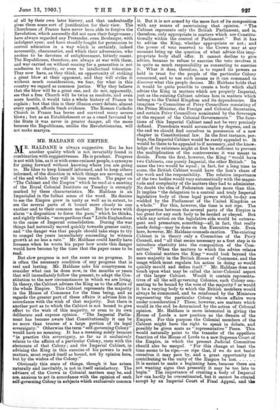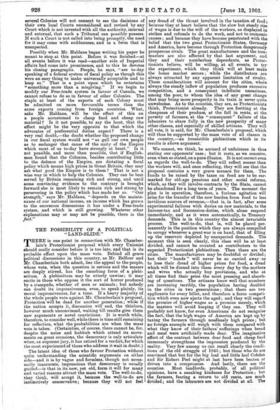MR. HALDANE ON EMPIRE.
MR. HALDANE is always suggestive. But he has another quality which is not invariably found. in combination with suggestiveness. He is prudent. Progress is not with him, as it is with some eminent people, a synonym for going forward without knowing where you are going to. He likes to keep himself informed, and to keep others informed, of the direction in which things are moving, and of the end which they will in time reach. The paper on "The Cabinet and the Empire" which he read at a meeting of the Royal Colonial Institute on Tuesday is strongly marked by these characteristics. Mr. Haldane is an Imperialist in the fullest sense of the word. He desires to see the Empire grow in unity as well as in extent, to see the several parts of it bound more closely to one another and to their common mother. But he views with alarm " a disposition to force the pace," which he thinks, and rightly thinks, "more perilous than" Little Englandism to the cause of Imperial consolidation. During the war things had naturally moved „quickly towards greater unity, and " the danger was that people should take steps to try to compel the years immediately succeeding to witness growth at no less a rate." Mr. Haldane could hardly have foreseen when he wrote his paper how acute this danger would have become by the time that the paper came to be read.
But slow progress is not the same as no progress. It is often the necessary condition of any progress that is real and lasting. Mr. Haldane asks his countrymen to consider what can be done now, in the months or years that will immediately follow the present, to adapt the Con.. stitution to the new circumstances in which we are living. In theory, the Cabinet advises the King as to the affairs of the whole Empire. This Cabinet represents the majority in the House of Commons for the time being, and as regards the greater part of these affairs it advises him in accordance with the wish of that majority. But there is another part as to which the Cabinet is not bound to give effect to the wish of this majority, or even to its own deliberate and express opinion. " The Imperial Parlia- ment has become aware that Constitutionally it can be no more than trustee of a large portion of its legal sovereignty." Otherwise the term "self-governing Colony" would have no meaning. It has a meaning solely because "in' practice this sovereignty, so far as it exclusively relates to the affairs of a, particular Colony, rests with the electorate of that Colony ; and the Imperial Cabinet, in advising the King in this exercise of his powers in such matters, must regard itself as bound, not by opinion here, but by the wishes of the Colony."
Obviously this state of things, though it has arisen naturally and inevitably, is not in itself satisfactory. The advisers of the Crown in Colonial matters may be, and are, anxious to act in accordance with the opinion of each self-governing Colony in subjects which exclusively concern it. But it is not armed by the mere fact of its composition with any means of ascertaining that opinion. " The Cabinet represents only the British Parliament, and is, therefore, only appropriate in matters which are Constitu- tionally within the control of Parliament." But it has to advise the King, whether appropriate or not ; and the power of veto reserved to the Crown may at any moment bring up the question of what advice this inap- propriate body shall offer. It cannot decline to give advice, because to refuse to exercise the veto involves it in quite as much responsibility as consenting to exercise it. What it does, therefore, is to regard its powers as held in trust for the people of the particular Colony concerned, and to use such means as it can command to discover what this people desires. Mr. Haldane holds that it would be quite possible to create a body which shall advise the King in matters which are properly Imperial, just as the existing Cabinet advises him in matters which belong to the United Kingdom and its dependencies. He imagines "a Committee of Privy Councillors consisting of the Prime Minister, the Foreign and Colonial Secretaries, and certain Privy Councillors nominated by the Sovereign at the request of the Colonial Governments." The func- tions of this Imperial Cabinet need not be very precisely defined. Precedents would accumulate by degrees, and in the end we should find ourselves in possession of a. new chapter in Constitutional law. In the first instance, per- haps, the Imperial Cabinet would be rarely appealed to. It would be there to be appealed to if necessary, and the know.. ledge of its existence might at first be sufficient to prevent the multiplication of the controversies it was meant to decide. From the first, however, the King "would have two Cabinets, one purely Imperial, the other British." In name the two would be equal ; in fact, for a long time to come, the British Cabinet would have the lion's share of the work and the responsibility. The relative importance of the two bodies would vary automatically with the magni- tude and complexity of the matters they had to administer. No doubt the idea of Federation implies more than this. It implies " the delegation to a central and truly Imperial legislative body of those legal powers which to-day are wielded by the Parliament of the United Kingdom as a whole." For this, however, the time is not ripe. The disproportion between the several parts the Empire is too great for any such body to be or obeyed. But while any action on the legislative side would be extrava- gant and premature, something—all, in fact, that really needs doing—may be done on the Executive side. Even here, however, Mr. Haldane counsels caution. The existing Cabinet is in theory only a Committee of the Privy Council, and " all that seems necessary as a first step is to introduce elasticity into the composition of the Com- mittee." When the matters to which the advice relates are Colonial matters the King " would look beyond the mere majority in the British House of Commons, and the usage which must regulate his action in doing so would quickly mould and define itself." Mr. Haldane does not touch upon what may be called the inter-Colonial aspect of this larger Cabinet. Would it contain representa- tives of all the self-gcverning Colonies, each Colony con. seating to be bound by the vote of the majority ? or would it be a, varying body to which the British members would always be summoned, and be reinforced by the Ministers representing the particular Colony whose affairs were under consideration ? These, however, are matters which would in the end be determined by the action of Colonial opinion. Mr. Haldane is more interested in giving tho House of Lords a new position as the • Senate of the Empire. For this purpose the Colonial members of the Cabmet might have the right to speak in debate, and possibly be given seats as " representative " Peers. This would naturally point to the transfer of the appellate function of the House of Lords to a new Supreme Court of the Empire, in which the present Judicial Committee should also be merged. " For this change at least the time seems to be ripe,—so ripe that, if we do not bestir ourselves it may pass by, and a great opportunity for contributing to the unity of the Empire be lost It is easiest to make a beginning here, because there are not wanting signs that presently it may be too late to begin." The importance of creating a body of Imperial law can hardly be overestimated, but it cannot be created except by an Imperial Court of Final Appeal, and the several Colonies will not consent to see the decisions of their own local Courts reconsidered and revised by any Court which is not invested with all the authority, internal and external, that such a Tribunal can possibly possess. If such a Court is not called into being promptly, the need for it may come with suddenness, and in a form that is unexpected.
Possibly when Mr. Haldane began writing his paper he meant to stop at this point. Before it was finished—at all events before it was read—another side of Imperial affairs had come into prominence, and to this he devotes his closing paragraphs. People, he says, " are to-day speaking of a federal system of fiscal policy as though this were an easy thing to make universally acceptable and to keep so." That is a point upon which he entertains " something more than a misgiving." If we begin to modify our Free-trade system in favour of Canada, we cannot refuse to do so in favour of other Colonies. The staple at least of the exports of each Colony must be admitted on more favourable terms than the same exports coming from foreign countries. What, asks Mr. Haldane, will be the effect of this on a people accustomed to cheap food and cheap raw material ? Is it not possible, to say the least, that the effect might be the very opposite to that which the advocates of preferential duties expect ? There is a very real doubt,—the doubt whether the proposed change in our fiscal system would not " so gall our own people as to endanger that cause of the unity of the Empire which most of us to-day have strongly at heart." Is it not possible, and more than possible, that if English- men found that the Colonies, besides contributing little to the defence of the Empire, are dictating a fiscal policy which means high prices in Great Britain, they may ask what good the Empire is to them ? That is not a wise way in which to help the Colonies. They can be best served by Britain remaining rich and strong, and until some convincing evidence to the contrary is brought forward she is most likely to remain rich and strong by persevering in the policy which has made her so. " Our strength," says Mr. Haldane, " depends on the mainte- nance of our national income, an income which has grown to the enormous dimensions it has under a Free-trade system, and which is still growing. Whatever other explanations may or may not be possible, there is the fact."











































 Previous page
Previous page